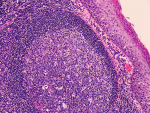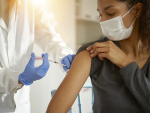Displaying items by tag: division of infectious diseases
This past June, through a competitive review process, the NIH renewed their five-year grant to continue UAB’s Center for AIDS Research pivotal work.
Tagged under
The UAB neurosurgery team performed an emergency brain aspiration on Easton Fothergill after he was rushed to UAB Hospital with a large brain abscess.
Clinical trial findings from the LATITUDE study show promise in long-acting HIV treatment for patients who have long struggled with daily HIV oral medications.
A UAB infectious diseases physician breaks down what you need to know about flu, RSV and COVID as people navigate colder months and have exposure to these viruses.
Tagged under
Tagged under
Analysis of a survey of 18,041 people in rural KwaZulu-Natal revealed a discrepancy between the ability of the South African health system to respond to the health needs of people with communicable diseases and the health needs of people with non-communicable diseases.
Tagged under
Some PD-1+CXCR5+CD4+ T cells will become germinal center-Tfh cells that are essential for B cells to become high-affinity antibody-producing cells. Others do not take that path, instead becoming memory T cells.
Tagged under
Today the National Institutes of Health has announced that UAB’s own Jeanne Marrazzo, M.D., has been selected to succeed Anthony Fauci, M.D., as the next director of NIH’s National Institute of Allergy and Infectious Diseases (NIAID) this fall.
Tagged under
The baby boy, born in late May 2023, is the first baby born from a uterus transplant outside of a clinical trial and UAB’s first baby from its uterus transplant program.
Tagged under
- release
- university of alabama system
- uab medicine
- school of medicine
- transplantation
- comprehensive transplant institute
- department of surgery
- division of transplantation
- department of obstetrics and gynecology
- division of gynecologic oncology
- division of maternal fetal medicine
- division of reproductive endocrinology and infertility
- department of radiology
- department of pathology
- department of medicine
- division of infectious diseases
- department of pediatrics
- womens history
The NIH grants will fund two studies evaluating the role of behavioral, geographic and demographic vulnerabilities in relation to HIV acquisitions among cis- and transgender women in the South.
Tagged under
UAB professor emeritus Michael Saag, M.D., will be the keynote speaker at the spring 2023 Service Learning and Undergraduate Research Expo.
Tagged under
The study found that using a vaginal swab was more accurate than using urine for three types of sexually transmitted infections.
These effector memory B cells appear poised for a rapid serum antibody response upon secondary challenge one year later, and evidence shows that the cells in this subset differ from all previously described memory B cell subsets.
Tagged under
- center for clinical and translational science
- release
- school of medicine
- department of microbiology
- department of medicine
- division of infectious diseases
- division of clinical immunology and rheumatology
- department of biomedical informatics and data science
- center for clinical and translational science
Having a bacterial infection at the same time as COVID-19 is a greater risk factor for COVID-19 severity and mortality than previously described risk factors such as advanced age, male sex or various comorbidities.
Tagged under
- release
- school of medicine
- department of medicine
- department of microbiology
- department of anesthesiology and perioperative medicine
- department of pediatrics
- division of pulmonary allergy and critical care medicine
- division of neonatology
- division of pediatric critical care medicine
- division of infectious diseases
- hugh kaul personalized medicine institute
- uab medical scientist training program
Hold onto your stomachs, folks. Norovirus is back and ready to spoil the party with its infamous symptoms.
Tagged under
The Alabama Department of Public Health shows widespread flu activity in all areas of the state. UAB’s Rachael Lee, M.D., urges the public to enact preventive measures to slow the spread of flu, and to ease the burden on health care systems.
Tagged under
Tagged under
- release
- office of the president
- office of the provost for student and faculty success
- uab strategic plan
- school of medicine
- oneal comprehensive cancer center
- department of medicine
- division of infectious diseases
- department of surgery
- uab medicine
- department of clinical and diagnostic sciences
- division of cardiovascular disease
- division of endocrinology diabetes and metabolism
- students
Two infectious diseases physicians break down what you need to know about flu, RSV and COVID as the colder months arrive and more people contract these viruses.
Tagged under
Tagged under
Wong received the award for her research, titled “Interactions between the human host and M.tb during subclinical tuberculosis.”
Tagged under



















